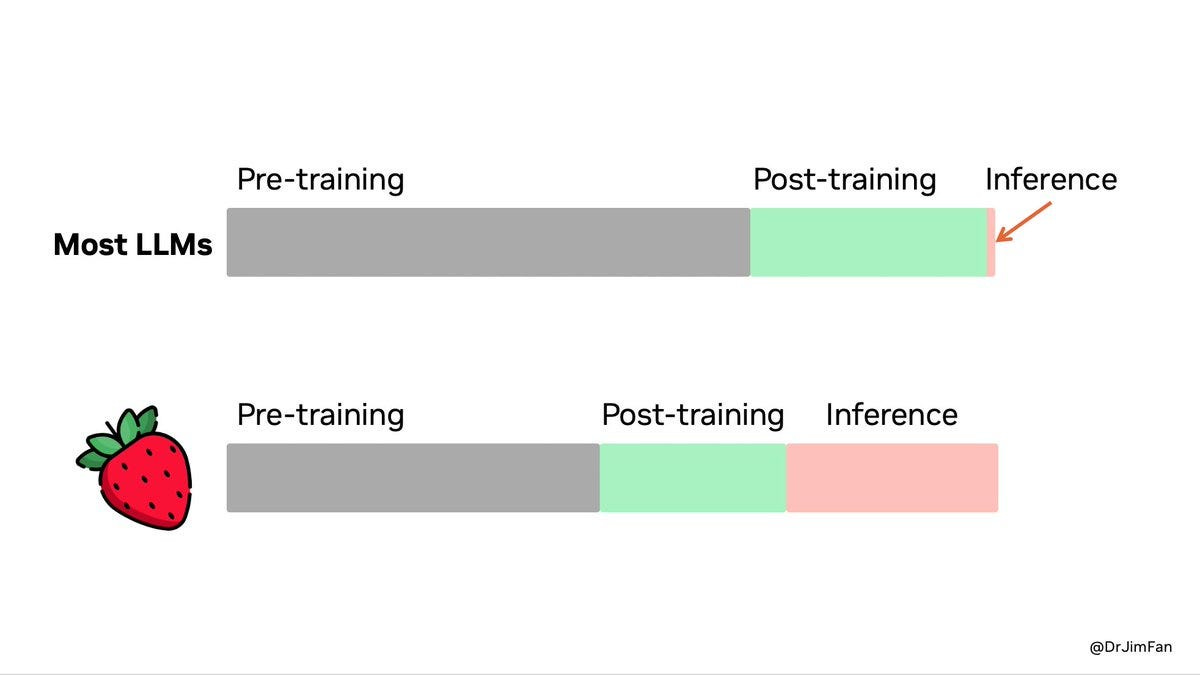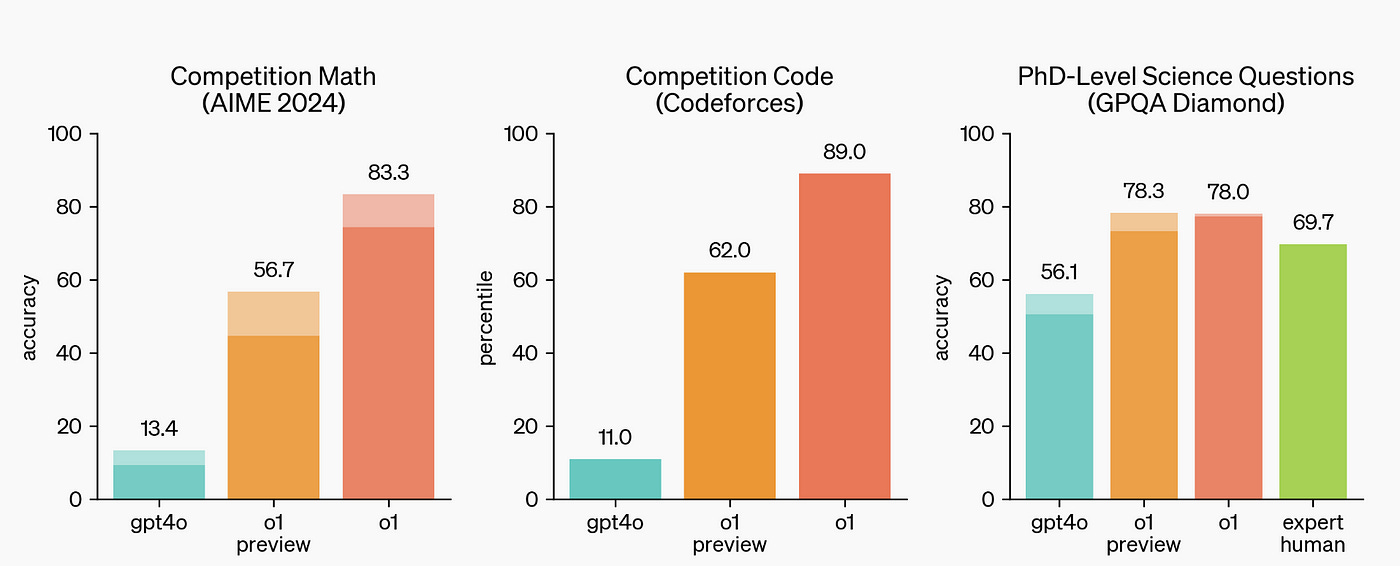Upcoming Events
🌁 SF & Bay Area
Fri, Oct 11th: 🧠 #SFTechWeek Happy Hour Wine Tasting with SVB 🍷
🗓️ Hungry for even more AI events? Check out SF IRL, MLOps SF, or Cerebral Valley’s spreadsheet!
🗽 NYC
☔ Seattle
🦞 Boston
Thu, Oct 3rd: 🧠 GenAI Collective Boston 🧠 AI Lightning Talks ⚡
🌆 Los Angeles
Tue, Oct 15th: 🧠 GenAI Collective LA 🧠 Consumer AI #LATechWeek
OpenAI's o1-Preview: A New Chapter in Generative AI
The evolution of language models has been nothing short of extraordinary. From the early days of GPT-2's impressive yet limited text generation to GPT-4's multimodal prowess, each iteration has pushed the boundaries of what's possible in artificial intelligence. Now, OpenAI has unveiled its latest innovation: the o1-preview model. `
OpenAI's o1 model boasts significantly improved reasoning, achieving the 89th percentile in competitive programming and exceeding Ph.D.-level performance in sciences. It autonomously employs chain-of-thought reasoning without extra prompting and introduces increased compute during inference, allowing it to handle longer, more complex tasks—potentially "thinking for hours."
While this enhanced reasoning comes at a higher computational cost, it's a game-changer for complex tasks. The efficiency in thought processes reduces the need for extensive rewrites, potentially saving significant development time.
o1 is a major leap forward, particularly in tasks that require multiple steps. It's built to autonomously use "chain of thought" reasoning, consistently improving task accuracy. Trained via reinforcement learning, o1 performs better the more time it’s given to think, marking a key shift from previous models. This could optimize AI deployment by focusing compute power during inference rather than just during training, offering a quicker, more effective feedback loop.

Noam Brown from OpenAI highlighted that though o1-preview excels in deep reasoning tasks, it may not always outperform models like GPT-4 in simpler scenarios where speed is preferred. The model shines in complex problem-solving, as demonstrated at the 2024 ACL conference, despite occasional shortcomings in simpler games.
Brown envisions future iterations capable of thinking for hours, days, or even weeks, tackling high-impact challenges like drug discovery and scientific breakthroughs. Drawing from successes in AI applications like poker and Diplomacy, o1-preview represents a collaborative effort to push the boundaries of AI reasoning.
A Paradigm Shift in AI Development
Unlike its predecessors, it employs a modular design, enabling specialized components to handle distinct tasks—whether it's language comprehension, maintaining context, or generating content. This flexibility allows the model to excel in multitasking environments, dynamically switching roles based on the requirements of the task at hand.

A standout feature is its heightened contextual awareness. The model can sustain coherence over extended interactions, remembering past conversations and adjusting responses accordingly. This capability is significant for applications in customer service, virtual assistants, and collaborative workspaces, where continuity and personalized responses are crucial.
Additionally, by leveraging advanced reinforcement learning from human feedback (RLHF), o1-preview fine-tunes its outputs to align with user expectations and societal values. This results in more accurate, contextually relevant, and ethically sound AI-generated content, enhancing its usefulness across a broad range of industries. Now, when you ask ChatGPT with o1 enabled a question, up pops an expandable thinking indicator that lets you see its thought process:
It gets the classic strawberry LLM problem correct.
OpenAI's o1 model isn't just transforming software development; it's catalyzing a paradigm shift across all fields of research and innovation. By automating multi-step reasoning, o1 empowers professionals to replicate year-long experiments in a fraction of the time, accelerating progress in domains from cancer treatment to mathematical theorem proving. Researchers are leveraging its capabilities to design nuanced medical protocols, solve complex mathematical proofs, and craft sophisticated poetic literature. The ability to handle intricate tasks with minimal human input is redefining what's possible in both technical and creative endeavors.
In this landscape, speed and adaptability are the new competitive advantages. With AI shouldering complex analytical and creative workloads, industries must deliver breakthroughs faster than ever. Organizations embracing AI-driven workflows will outpace their peers, rapidly advancing from hypothesis to discovery. Those clinging to traditional methodologies risk obsolescence as AI accelerates cycles of discovery and lowers barriers to groundbreaking work.
Future Outlook
Looking ahead, o1-preview is merely the forerunner of even more sophisticated AI systems. Future models will likely integrate multimodal inputs—processing text, images, audio, and video—vastly expanding their applicability across all sectors. Leaders must reevaluate their operational models and research architectures. Personalized AI tailored to specific disciplines or individuals will enhance relevance, privacy, and security. The emergence of reliable AI agents capable of managing complex experiments and handling long-term contexts will allow innovators to produce fully autonomous workflows, creating significant impact in every industry. Such AI assistants will redefine innovation, discovery, and creativity. The market will reward those who integrate this level of AI sophistication, while others risk being left behind in a rapidly evolving intellectual landscape.
With that, we hope you enjoyed this deep dive into the implications of OpenAI's latest model. We’d love to hear how you see the o1-preview model shaping the future of AI and its impact on various industries. If you'd like to share your thoughts, feel free to reach out on our community Slack or email us at eric@gaicollective.com or aqeel@gaicollective.com for a feature in our next newsletter!
Partner Event Spotlight
We're thrilled to support LA's Largest Generative AI Hackathon, which will launch LA Tech Week in October! Over $100k in prizes up for grabs and the chance to go skydiving with one of the world’s most elite aerial teams.
Events Spotlight
Miami
Our Miami chapter co-hosted a Research Roundtable on Sept 24. More than 100 turned out to hear from 3 experts in their fields at the Miami Dade College AI Center.
Summary with Key Takeaways:
1. Aleksey: NLP: How Did We Get Here?
🌟 Explored the evolution of NLP from basic models like TF-IDF to advanced architectures like Transformers.
Key takeaway: understanding historical context helps us to understand and overcome shortcomings in the current state-of-the-art.
2. Alex: Benchmarks: What Do They Tell Us?
📊 Discussed the importance and limitations of benchmarking LLMs, highlighting that benchmarks can be marketing tools rather than true performance indicators.
Key takeaway: while benchmarks can help us understand what different models do well, it’s important to understand how we can be fooled when they’re used as marketing tools.
3. Kye: Automated Prompt Engineering
🤖 Introduced methods for optimizing prompts to improve AI performance, emphasizing that automating this process saves time and enhances efficiency.
Key takeaway: in the same way LLMs reliably structure human-readable content, they can also structure LLM prompts reliably and far more quickly than humans.
NYC
Our New York chapter had a busy September, kicking off with the RAG++ NYC event where we joined forces with Datastax, OpenAI, and Vercel to hack away on the latest AI tech. We then hosted our AI Founder Social, providing a vibrant platform for entrepreneurs to network and share insights on navigating the dynamic AI startup landscape. The month culminated in our Research Roundtable (pictured), where leading AI researchers presented their work on the limitations of the transformer architecture & deploying topic modeling systems to production for real world use cases. We have a lot of exciting announcements coming soon for October, follow our NYC Luma Calendar to stay in the loop!
Join the GenAI Collective team! 👷
The GenAI Collective is growing and we need passionate, dedicated individuals to join our team! If you want to help shape the future of our community, we have tons of exciting ways to get involved. Read more about each opportunity below and learn how you can contribute to this vibrant community!
About Eric Fett
Eric leads the development of the newsletter and online presence. He is currently an investor at NGP Capital where he focuses on Series A/B investments across enterprise AI, cybersecurity, and industrial technology. He’s passionate about working with early-stage visionaries on their quest to create a better future. When not working, you can find him on a soccer field or at a sushi bar! 🍣









